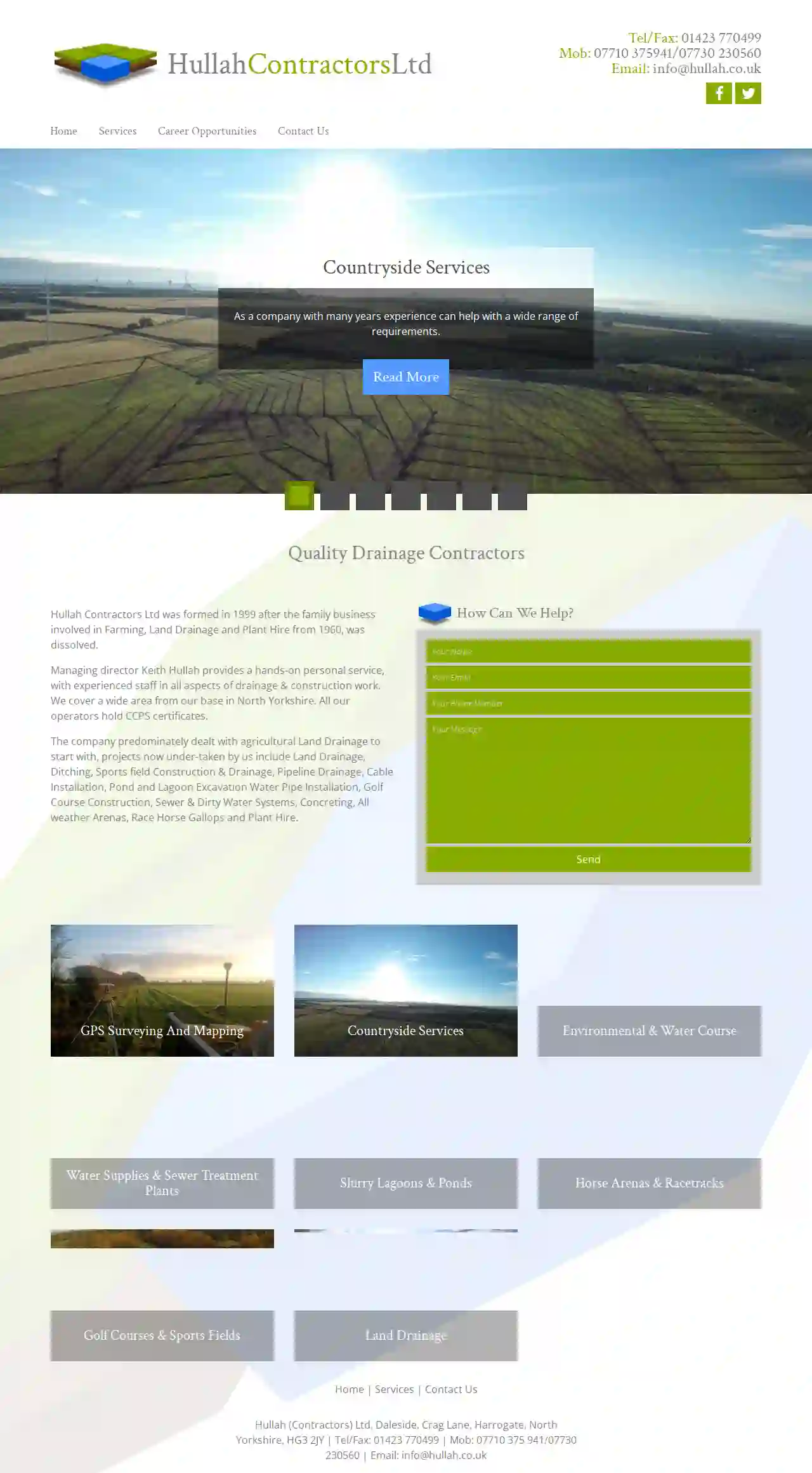Excavation Contractors Harrogate
Top Excavation Contractor in Harrogate
Get 3 FREE Land Excavation quotes for your project today! Compare profiles, reviews, accreditations, portfolio, etc... and choose the best service.
- Ru
Rural & County Builders Ltd
4.726 reviewsHarrogate, GB- Services
- Why Us?
Get Quote 
Hullah Contractors Ltd
52 reviewsDaleside, Crag Lane, Harrogate, North Yorkshire, HG3 2JY, GBQuality Drainage Contractors Hullah Contractors Ltd was formed in 1999 after the family business involved in Farming, Land Drainage and Plant Hire from 1960, was dissolved. Managing director Keith Hullah provides a hands-on personal service, with experienced staff in all aspects of drainage & construction work. We cover a wide area from our base in North Yorkshire. All our operators hold CCPS certificates. The company predominately dealt with agricultural Land Drainage to start with, projects now under-taken by us include Land Drainage, Ditching, Sports field Construction & Drainage, Pipeline Drainage, Cable Installation, Pond and Lagoon Excavation Water Pipe Installation, Golf Course Construction, Sewer & Dirty Water Systems, Concreting, All weather Arenas, Race Horse Gallops and Plant Hire.
- Services
- Why Us?
- Gallery
Get Quote- DG
DG and M Construction
1Harrogate, GB- Services
- Why Us?
Get Quote - Ni
Nidderdale National Landscape
4.72 reviewsHarrogate, GB- Services
- Why Us?
Get Quote - CJ
CJT Earthworks Ltd
1Harrogate, GB- Services
- Why Us?
Get Quote - D
D Sockett Groundworks Ltd
1Harrogate, GB- Services
- Why Us?
Get Quote 
Wharfedale Paving
1Harrogate, GBWelcome to Wharfedale Paving Wharfedale Paving is a family run business with over twenty years experience. We specialise in driveways, blockpaving, patios and landscaping.
- Services
- Why Us?
- Gallery
Get Quote- RH
RHS Garden Harlow Carr
4.76 reviewsHarrogate, GB- Services
- Why Us?
Get Quote - Mo
Montgomery Homes
44 reviewsHarrogate, GB- Services
- Why Us?
Get Quote - SJ
SJ Landscapes & Trees
51 reviewsHarrogate, GB- Services
- Why Us?
Get Quote
Over 11,537+ Excavation Companies registered
Our excavation providers operate in Harrogate & surrounding areas!
ExcavationHQ has curated and vetted Top Excavation Businesses in and around Harrogate. Find the most trustworthy contractor today.
Frequently Asked Questions About Excavation Contractors
- Project Size and Scope: Larger, more complex excavations naturally take longer.
- Soil Conditions: Rocky or challenging soil types can slow down progress.
- Site Accessibility: Limited access might require more time for maneuvering equipment and hauling materials.
- Weather: Inclement weather can cause delays.
- Permitting and Inspections: Waiting for permits or inspections can extend the timeline.
- Clearly Define the Scope: Outline the project's goals, including the excavation area, depth, grade, and intended use.
- Obtain Necessary Permits: Research and acquire any required permits from your local authorities.
- Mark Utility Lines: Contact your utility companies to locate and mark underground utilities to prevent damage.
- Communicate with Neighbors: Inform your neighbors about the project's timeline and potential noise or disruptions.
- Prepare the Site: Clear any obstacles, such as vegetation, furniture, or structures, from the excavation area.
- Discuss Safety Protocols: Review safety procedures with the contractor to ensure a safe work environment.
How long does an excavation project take?
What is the difference between cut and fill excavation?
Cut: Involves excavating soil from an area where the existing grade is higher than the desired grade.
Fill: Refers to using the excavated soil ('cut' material) to raise the grade in an area where the existing grade is lower than desired.
This method minimizes the need to import or export soil, reducing costs and environmental impact. It's commonly used for site preparation, road construction, and landscaping.
What should I do before excavation starts?
What is the difference between topsoil and subsoil?
Topsoil: The uppermost layer, typically rich in organic matter, nutrients, and microorganisms. It's essential for plant growth and is often darker in color.
Subsoil: The layer beneath the topsoil, containing less organic matter and generally denser. It provides support for roots but is less fertile than topsoil.
During excavation, topsoil is often removed and preserved separately for later use in landscaping, while subsoil is typically used for backfilling or other less demanding applications.
How long does an excavation project take?
- Project Size and Scope: Larger, more complex excavations naturally take longer.
- Soil Conditions: Rocky or challenging soil types can slow down progress.
- Site Accessibility: Limited access might require more time for maneuvering equipment and hauling materials.
- Weather: Inclement weather can cause delays.
- Permitting and Inspections: Waiting for permits or inspections can extend the timeline.
What is the difference between cut and fill excavation?
Cut: Involves excavating soil from an area where the existing grade is higher than the desired grade.
Fill: Refers to using the excavated soil ('cut' material) to raise the grade in an area where the existing grade is lower than desired.
This method minimizes the need to import or export soil, reducing costs and environmental impact. It's commonly used for site preparation, road construction, and landscaping.
What should I do before excavation starts?
- Clearly Define the Scope: Outline the project's goals, including the excavation area, depth, grade, and intended use.
- Obtain Necessary Permits: Research and acquire any required permits from your local authorities.
- Mark Utility Lines: Contact your utility companies to locate and mark underground utilities to prevent damage.
- Communicate with Neighbors: Inform your neighbors about the project's timeline and potential noise or disruptions.
- Prepare the Site: Clear any obstacles, such as vegetation, furniture, or structures, from the excavation area.
- Discuss Safety Protocols: Review safety procedures with the contractor to ensure a safe work environment.
What is the difference between topsoil and subsoil?
Topsoil: The uppermost layer, typically rich in organic matter, nutrients, and microorganisms. It's essential for plant growth and is often darker in color.
Subsoil: The layer beneath the topsoil, containing less organic matter and generally denser. It provides support for roots but is less fertile than topsoil.
During excavation, topsoil is often removed and preserved separately for later use in landscaping, while subsoil is typically used for backfilling or other less demanding applications.